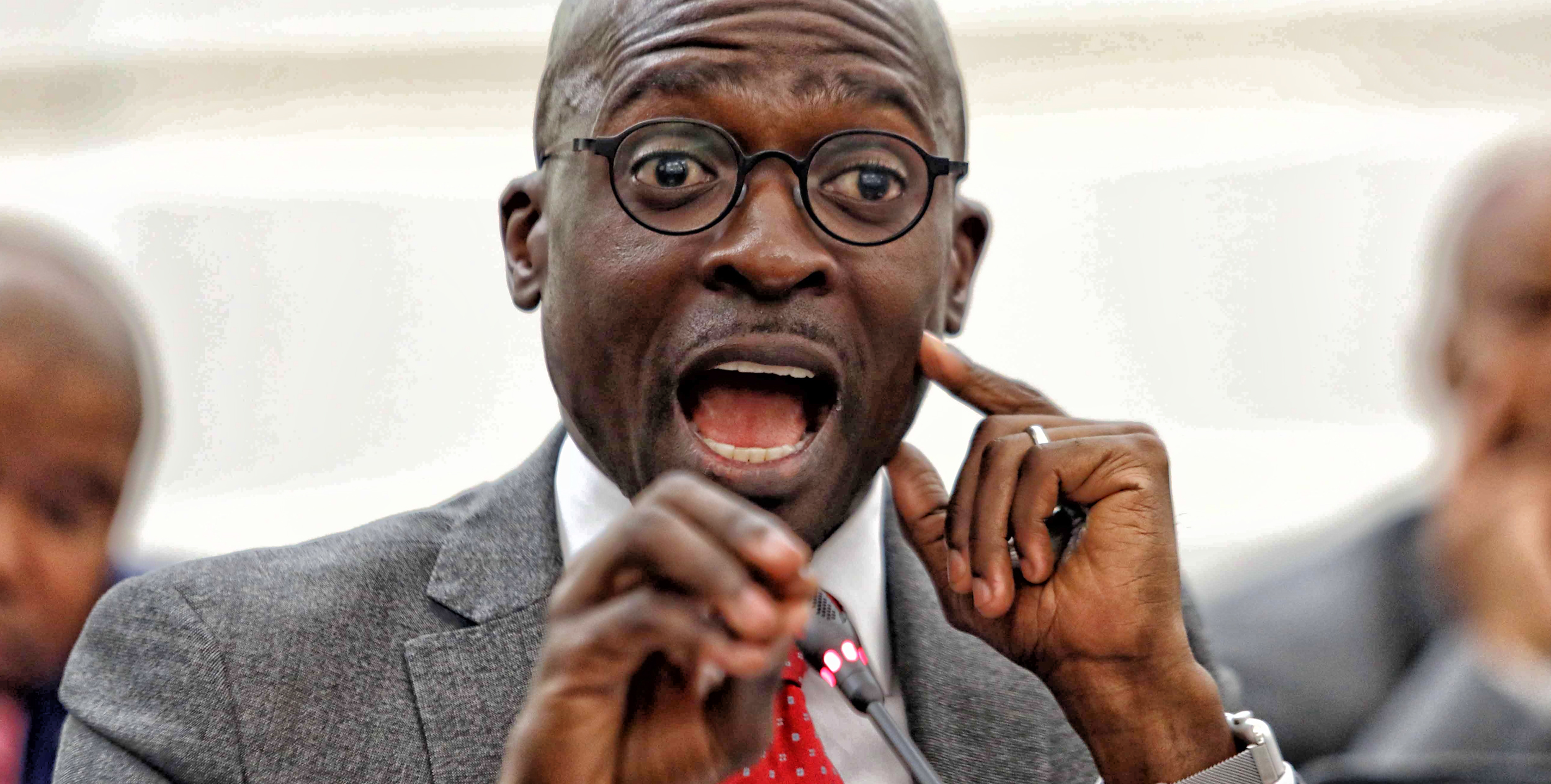Gigaba’s name is found 36 times in the pages of a scathing report into the rail purchase by Transnet which cost the state-owned transport giant billions more than it should have and is one factor in the pressure put on public finances.
He is also alleged to have illegally benefited from Transnet security while he was in Cabinet.

Then Home Affairs Minister Malusi Gigaba answers questions during his appearance before the parliamentary hearing into state capture on March 12, 2018 in Cape Town, South Africa. (Photo by Gallo Images / Sowetan / Esa Alexander)
The report, released on Friday morning, also finds that two former Transnet CEO’s, Brian Molefe and Siyabonga Gama, “compromised the procurement process and benefited China South Rail (one of three winning bidders) by changing the prescribed conditions after the bid closed.”
With Molefe, the former chief financial officer Anoj Singh is found to have cost Transnet (and by extension, South African citizens) billions of rand more than it should have.
Molefe’s name comes up on 106 pages in the report which reveals how he repeatedly bent the rules to favour China South Rail (CSR), the Chinese state-owned company which won a lions’ share of the contract. CSR is found to have missed several contract deadlines.
The purchase of the 1,054 locomotives lies at the heart of State Capture and it reveals how a plan to recapitalise the country’s transport system as part of a massive infrastructure-led economic growth plan grow was despoiled by both state and non-state actors.
China South Rail, now part of the merged Chinese state-owned rail company, now called CSR Corp, is shown to have benefited from insider information given to it by Transnet executives and it reveals that Molefe repeatedly communicated with the company during the bidding process.
“Molefe’s communication with PAN (China South Rail’s bidding name) was sent to individuals who have links with the Guptas and companies associated with the Gupta family,” finds the report.
Previous reports have shown that the Gupta family’s South African lieutenant, Salim Essa, won huge commissions on each locomotive from his business alliance with the Chinese rail giant.
The report names four Transnet executives as central to corrupting the rail deal: they are Molefe, Gama, Singh and Thamsanqa Jiyane, the group chief procurement officer at Transnet.
They were assisted by the board acquisitions and disposal committee of the Transnet board as well as by board members themselves. “(This) compromised the integrity of the procurement process and benefited China South Rail (CSR) by changing the prescribed conditions after the bid closed.” This prejudiced other potential bidders, the report finds.
“Molefe, Gama, Jiyane and the board members’ actions exposed Transnet to potential litigation and reputational risk, should other tenderers become aware of the irregular amendments of the evaluation criteria,” finds the forensic report by the company Fundudzi for the National Treasury.
Gigaba has also earned a central spot in the Treasury probe. By signing the Locomotive Supply Agreement (LSA) he “compromised the procurement process” and also acted outside his authority in advising Transnet to continue to procure the locomotives before the then Finance Minister (Pravin Gordhan) had granted an exemption for the purchase in terms of the preferential procurement rules.
“We determined… that Minister Gigaba further advised Transnet in a letter dated 7 December 2012 to disregard (an) instruction note referred to stage 2 of procurement processes, which stated “Only bids that achieve the minimum stipulated threshold for local production and content may be evaluated further. Minister Gigaba advised Transnet to rather establish an evaluation framework that provides reasonable incentives to suppliers.”
What this means is that Gigaba overrode local content rules to benefit the Chinese. Local content provisions are geared at rekindling South Africa’s manufacturing capabilities. In addition, a letter quoted by the report reveals how Gigaba tries to deflect the National Treasury’s final authority over the purchase. The minister writes that “Transnet should continue to procure as if extension to the exemption is in place;
“No communication should take place between the SOC (state-owned company, that is, Transnet) and National Treasury pertaining to the PPPFA (Preferential Procurement Policy Framework Act) until the situation has been resolved;
“Should any queries be directed to the SOC from National Treasury regarding the PPPFA, please refer National Treasury to my office;”
This may shed light on why Gigaba would later be made Minister of Finance when former President Jacob Zuma fired Pravin Gordhan from that role.
Approached for comment, Gigaba said he hadn’t yet seen the report. He, Molefe and the other implicated officers have consistently denied allegations of being complicit in state capture.
The report has also found that Molefe and Transnet’s former chief financial officer Anoj Singh “misrepresented facts to the Transnet board by indicating that the amount of R34-6 billion excluded potential effects from forex and hedging. This misrepresentation by Molefe and Singh contributed to the increase in ETC (cost) of by at least R6.7-billion.” DM
See graphic here from our archives, with report here: 





















 Become an Insider
Become an Insider